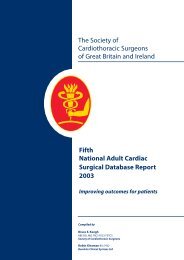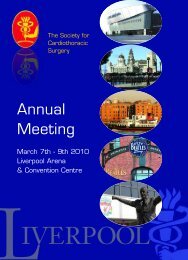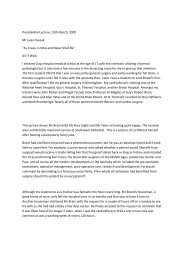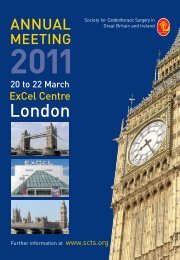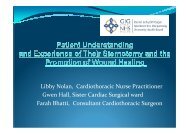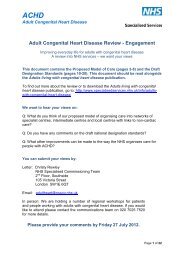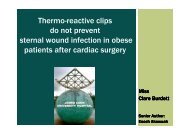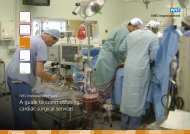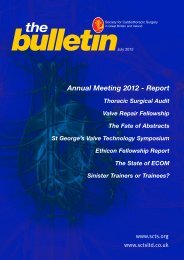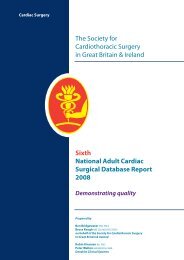Download - Society for Cardiothoracic Surgery
Download - Society for Cardiothoracic Surgery
Download - Society for Cardiothoracic Surgery
You also want an ePaper? Increase the reach of your titles
YUMPU automatically turns print PDFs into web optimized ePapers that Google loves.
July 2010 41<br />
President’s Address continued from page 39<br />
they will not take on high risk cases. It is also clear that we need<br />
to provide some more positive support, both <strong>for</strong> surgeons and <strong>for</strong><br />
Medical Directors. In the few cases in which further investigation<br />
was apparently needed, we have used the Royal College of<br />
Surgeons “Invited Review Mechanism” – the <strong>Society</strong> does not get<br />
involved in any <strong>for</strong>mal local review.<br />
One of the most important things that this highlighted <strong>for</strong> me was<br />
that we need to support each other. Much of how we function as<br />
surgeons is based on our own in-built confidence in our ability.<br />
You will be aware of the experience of Professor Marc de Leval<br />
when he went through the difficult period of having a run of<br />
deaths with the arterial switch operation in babies. To his huge<br />
credit he analysed this issue in detail and has written a number of<br />
important publications. In the Lancet in 1997, he said “What I<br />
have learned most from my re-training is to re-gain confidence and<br />
also that one should never give up”.<br />
Per<strong>for</strong>mance<br />
The Psychologists have a model which aids understanding of the<br />
relationship between per<strong>for</strong>mance and<br />
stress. We all understand that some stress<br />
is good - as the stress/arousal level<br />
increases your per<strong>for</strong>mance increases.<br />
However there is a peak per<strong>for</strong>mance after<br />
which further stress causes a decline. A<br />
group called “My Peak Potential Limited”<br />
has done some work with Leeds<br />
Metropolitan University looking at<br />
impaired per<strong>for</strong>mance. They highlighted<br />
the fact that this relates to lack of<br />
confidence, lack of motivation, inability to<br />
deal with stress and a negative mental<br />
attitude.<br />
The writer of Ecclesiastes says:<br />
“Two are better than one because if one<br />
falls down his friend can help him up” .<br />
We should take this to heart – we will<br />
probably all go through periods of doubt<br />
and lack of confidence during our career. I<br />
know that I have. As colleagues we need to recognise that and<br />
support each other through that process.<br />
No Presidential Address would be complete without a look to the<br />
future. Need to remember though the words of Niels Bohr<br />
(Physicist 1885-1962) who said “Prediction is very difficult,<br />
especially about the future”.<br />
This is well illustrated in a clip from the BBC News<br />
www.news.bbc.co.uk/2008. A 58 year old man was given the<br />
diagnosis of mesothelioma with a prognosis of 9 months survival.<br />
He was feeling very positive and optimistic and so went to the<br />
“bookies” – William Hill gave him a 50/1 odds <strong>for</strong> a 2 year survival.<br />
In June 2008 he collected £5000.<br />
“Sometimes I believe<br />
people are perceived as<br />
a problem, a medical<br />
problem, a physical<br />
problem. Some<br />
hospitals see patients<br />
as no more than a set of<br />
medical problems.”<br />
Archbishop Vincent Nicholls<br />
So what of the future? We know our patients are getting older –<br />
this was clear in the analysis in the national database report. A<br />
recent article in the BMJ showed the predicted number of people<br />
over the age of 80 in countries around the world. The UK is<br />
somewhere in the middle of the range but the number over 80<br />
predicted to double by 2030 and treble by 2050. Again we know<br />
from the database that older patients stay longer and will<br />
consume more resources.<br />
This prompts me to reflect that our society (in general, not the<br />
SCTS) seems to have lost sight of the fact that death is a certain<br />
outcome of life. It seems that we don’t talk about death and that<br />
death should occur in hospital rather than at home in family<br />
surroundings. This begs the question of what are we trying to<br />
achieve with our high tech medical care. Oscar Wilde’s Dorian<br />
Gray tried to maintain his eternal youth with disastrous<br />
consequences. The recently appointed Roman Catholic<br />
Archbishop, Vincent Nichols, has attacked the NHS over lack of<br />
compassion. He said “sometimes I believe people are perceived<br />
as a problem, a medical problem, a physical problem. Some<br />
hospitals see patients as no more than a<br />
set of medical problems.” He argued that<br />
calls <strong>for</strong> assisted suicide and euthanasia<br />
reflected a society that did not know how to<br />
deal with death.<br />
Training<br />
Enough of death. So what of training in the<br />
future? We as a specialty, began discussing<br />
the impact of the European Working Time<br />
Directive back in 2002. A Working Group<br />
Report at that stage recommended that we<br />
move towards provision of service with<br />
surgeons’ assistants and nurse<br />
practitioners as there would be fewer<br />
trainees. Some units began to do that and<br />
more are now following suit. I have been<br />
very frustrated to hear discussions on the<br />
European Working Time Directive from<br />
sources which should be better in<strong>for</strong>med.<br />
There seems to be a belief that trainees<br />
have to leave on the dot of 48 hours in the<br />
week – in fact under the European Working Time Directive you can<br />
work up to 76 hours in one week. The whole focus of the directive<br />
is to ensure appropriate rest – it states that you should not work<br />
more than 13 hours at a stretch without a rest period. Personally I<br />
do not have a problem with that. The older generation here will<br />
remember going in to hospital on a Friday morning and coming<br />
home on Monday evening. Things were generally quieter in those<br />
days and we did get some sleep but that duty period was surely<br />
unacceptable and nobody could justify that. The other irony in the<br />
discussions is that current UK legislation (in the <strong>for</strong>m of the “New<br />
Deal” which was implemented in 1991 under the previous<br />
Conservative Government) is more restrictive of working hours<br />
than the European Working Time Directive.



